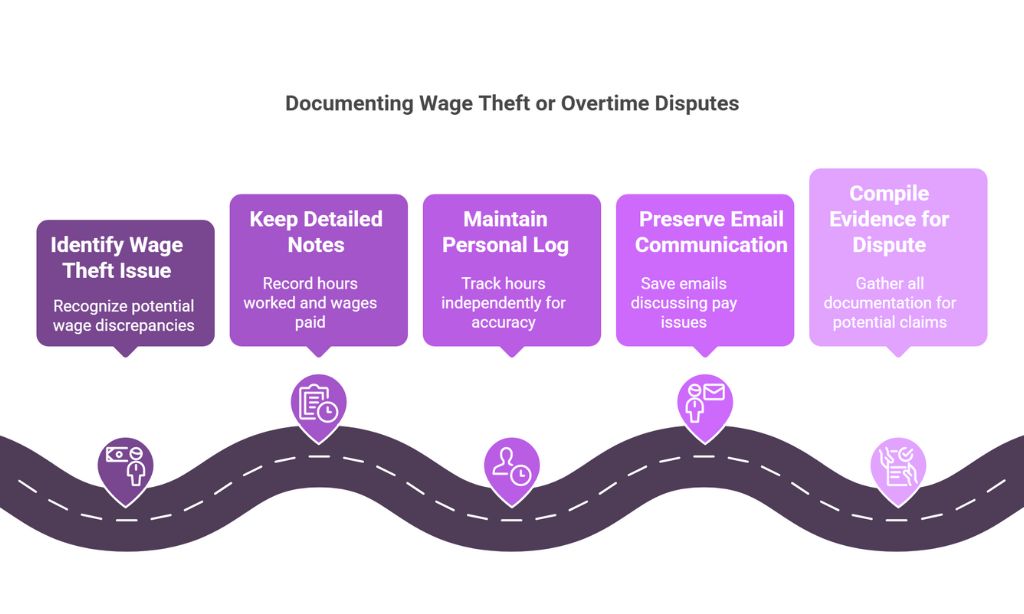Boston, Massachusetts, is a vibrant city rich with history, culture, and the resilient spirit of its residents. From its cobblestone streets to its innovative business community, Boston thrives on hard work and opportunity. Yet, even in this dynamic city, some workers face wage theft and overtime pay disputes. In a community known for its commitment to fairness and civic engagement, any breach of labor rights can feel like a personal setback. In such situations, it becomes paramount to be aware of the essential actions one can take to safeguard their rights and pursue appropriate legal remedies.
When employers withhold wages or ignore overtime hours, the impact goes beyond lost income and strikes at the core of a worker’s dignity. This article outlines crucial steps to address such issues by offering guidance for those whose rights employers have compromised. Workers can regain control with expert legal support and a strong local network. Remember, DGP Firm is ready to stand by you in your fight for justice, as your rights matter, and recovery starts now with informed action.
Understanding Wage Theft
Wage theft is the non-payment or underpayment of full wages due to a worker by an employer, which could be in the form of unpaid overtime, not paying for all hours worked, or making illegal deductions from wages. The economic repercussions can be drastic, thus forcing workers to forgo fulfilling their basic needs. It is essential to be aware of signs of wage theft. Workers should periodically examine pay stubs and employee records. They should note down any discrepancies or missing hours on time. If you identify potential theft before the infliction of considerable damage, you can respond to such issues promptly with a proactive approach.
Identify Overtime Disputes
Specifically, overtime disputes commonly arise because workers are not paid the proper rate for hours worked more than 40 hours in a workweek. Numerous laws in regions worldwide require higher pay rates for overtime hours, often at a rate of one and a half times one’s wage. Employees should know whether they are exempt or non-exempt from overtime requirements depending on their job duties. Understanding your classification is crucial because it can determine your eligibility for overtime pay. Awareness of employment contracts and local labor regulations is paramount to identifying remuneration conflicts.
Documenting Evidence
Evidence is critical when dealing with wage theft or overtime disputes. Detailed documentation lays the groundwork for any statement. Employees should keep notes about hours worked, wages paid, and communication with employers about pay. Keeping a log of hours worked for yourself can complement this. When official records are rarely accurate, then a personal log is essential. You must preserve emails between you and your employers regarding these pay differences, as this serves as proof.
Seeking Mediation
Most of the time, directly conversing with the employer will help resolve the disputes. It may not always come to an employer’s attention that there is a mismatch. You can calmly bring it up, which opens up a space for discussion and even helps resolve the problem without making an issue out of it. Mediation can be a viable way for the parties to work together if direct talks fail to yield results. Consider using a neutral third party to help flesh out the conversations and create agreement. Local labor departments or legal aid organizations usually provide mediation services.
Filing a Complaint
A formal complaint may be necessary if informal resolutions are unsuccessful. Employees can lodge complaints with labor departments or similar governmental organizations. Such bodies investigate allegations and enforce labor laws, which allow workers to pursue justice. Employees should document everything and list their claims when preparing for the complaint process. Legal or labor activists can help workers with this process and, in particular, ensure they do everything right.
Pursuing Legal Action
In some cases, litigation ends up being the final option. While legal proceedings can be complicated and lengthy, it may be the best course of action to conclude conflicting affairs. Whatever path they take, workers should seek the advice of legal professionals to determine if they have a viable lawsuit. These legal actions always involve some potential risks. A labor law attorney can help workers understand the process and make educated decisions. Workers whose rights are already limited may choose to have legal representation to defend them well enough.
Empowering Workers
Educating workers can help prevent wage theft and overtime disputes. Workers must learn about employee rights and compliance laws. This awareness allows individuals to act when needed, thus resulting in a more just workplace. Labor organizations offer workshops and resources that can deepen your understanding. Encouraging community dialogue and finding support from other workers will only amplify the power of their voices. An informed populace is a powerful defense against unlawful working environments.
Takeaways
It can be nerve-wracking to face wage theft or disputed overtime, but proper action and knowledge of your rights can see you through to a suitable resolution. Several options are available to deal with these matters, including documenting evidence and requesting mediation or litigation. Doing so empowers workers to control their fates in the workplace. While this path may be arduous, you can approach it with the proper guidance to secure a just outcome.









































